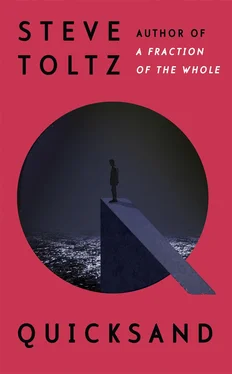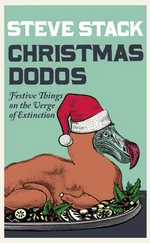‘That would be Constable Weir,’ I said.
It was then, Aldo continued, that it occurred to him, possibly out of an overwhelming sense of the futility of the exercise, or the simple unlikelihood of justice, how amusing it might be to describe his own face.
‘You did what?’
There followed an intense marathon as Aldo recalled his precise features, based on photographs and countless hours staring unhappily into mirrors, and described himself with narcissistic intensity and an almost hallucinatory level of concentrated precision (lightly copper complexion, slightly acned with multiple crosswise scars; clenched, rounded jaw; chestnut-brown hair thinning to a single vertical dagger; narrow facial shape with high forehead and horizontal wrinkles; bushy eyebrows and blue deep-set eyes with small irises; off-white teeth; medium-sized chiselled nose with pronounced nasal wings; low cheekbones; large earlobes; downturned lips, with tendency to lower-lip pout and a pouching of the skin below the lip corners, etc.) Constable Weir drew and Aldo examined and corrected and Constable Weir — despite the silently dawning realisation of the farce — adjusted and redrew and grew weary of their collaboration but on the whole was patient, exact, determined not to fail him. After two and three-quarter industrious hours and now with barely restrained fury, Constable Weir printed and slid the image across the desk. Aldo looked at it impassively; he felt like the exact sum of his parts, no more, no less.
Is this him? Constable Weir asked.
Yes, Aldo said. That’s the bastard.
An hour later we were in the Hotel Hollywood on Foster Street, talking about violent horror movies, the housing market and our sex obsessions — torture porn, real estate porn and porn porn — before Aldo began to ask me questions about Tess and our marital state; he was doing his amateur psychologist bit that he’d first developed to soften potential investors. I’d seen it a bazillion times. Using tactics gained from years of compulsively reading psychology, and wielding concepts that I’m not entirely certain he had a complete or even rudimentary grasp of, he would lean into someone’s face and gently tug with his hypnotic, sibilant voice; he screwed up his eyes as if trying to see them through the fog of their complicated insecurities, which makes a person, I’ve noticed, strain to be clearer. Then he would lean back as if to give the subject space to knock down their own fortifications. He was pretty good at conferring the illusion of long-term friendship on a stranger, the way his gaze fixed on their pupils with such intensity. He even did this with me; I couldn’t help feeling flattered by both his focus and what his focus illuminated: the subtle complexity of my own psyche.
‘This isn’t the life I planned for myself, but maybe that’s what I like about it,’ I lied. But something about Aldo’s single follow-up question, asked in a steady, uninflected voice (‘How does Tess feel about your inability to complete a single work of writing?’), had me tearily confessing how her body used to be a standing invitation but now she had stopped allowing me to touch her breasts, which basically made them like fake pockets on a designer jacket, and how sometimes when she looked at me I felt I was being frowned upon by a tribe of elders, and how this marriage had become a bad trip I was going to have to ride out if I wanted to continue living with my daughter.
The problem perhaps was that Tess had undergone an unexpected blossoming of mind and spirit; the failed actress, ex-bartending punk and occasional shoplifter that I married had now earned a social science degree and found a job with the office of the Public Guardian — essentially as a substitute decision-maker for people deemed to have insufficient cognitive capacity to make their own. All her clients had some kind of disability — acquired brain injury, drugor alcohol-related memory impairment, intellectual dysfunction — and she made daily decisions about where they were to live, shifting dementia patients out of squalor into aged care facilities, even deciding what medical treatment they should receive, most recently giving consent to an amputation for a retired bus driver who had refused it. Her passion for social work grew in direct proportion to my ambivalence for policing. In her presence I felt my deficiencies throb. Especially in the wake of that last disastrous novel, my fizzled writing career was the elephant in every room of the house. Sure, I still had promise, but less of it, and more dribbled away each year. It seemed obvious that I should be doing the heavy lifting of Sonja-rearing while Tess was allowed to flourish at her career, but I hadn’t given in to her on that issue, and now we fought all the time, about whose parents were better grandparents to Sonja, about how best to discipline this fierce little wind of a girl, about who deserved the night out when babysitters were scarce, about anything. Tess was gnawing at the ties that bound us, and in terms of love, I felt like I was campaigning for my re-election, on the verge of being voted out by my single constituent, voted out of her heart by her head.
Aldo sipped his beer without taking his eyes off me. The lurking bartender took our empties and replaced them with fresh ones. I explained, almost sobbing now, that at first when I left for work, Tess would say, in a trembling voice, ‘Don’t get shot,’ but as the years went by, that phrase had become imbued with its opposite meaning.
Aldo swished beer around his mouth before swallowing. He said, ‘Remembering the past is like watching a Hollywood movie, in that you never see the characters go to the toilet.’
‘What’s that supposed to mean?’
He tore his coaster into little paper crumbs — and trotted out a few trenchant observations. ‘You’re a frustrated artist in search of a consoling diagnosis, and it’s interesting that the debilitating perfectionism that has torpedoed your professional writing career is completely absent in your relationship, which you expect to work entirely without your effort, as if a relationship has not only its own intelligence but its own will to live. Guess what, Liam? It doesn’t.’ He then said that a person who won’t abide reminiscence is someone who hates the present, and he also thought it was interesting I hadn’t mentioned my fear that Tess had already found someone else (he was spot on — I suspected she had grown unreasonably close to the co-worker in the fawn windbreaker who dropped her home one time); he told me, in a tone I found uncharacteristically condescending, ‘What you experience as emotional pain is only your reaction to the circumstance and you therefore bear a degree of responsibility for it.’ When I asked, ‘Has that comment ever actually helped anyone?’ it was not clear by his shrug that it had.
Aldo, I could see, was in crisis mode himself; he was devastated by the shocking news of the wedding, and it was at long last dawning on him that he and Stella would never get back together, yet because his love had not diminished in any form, and was so thoroughly deflected by its intended recipient, it was in danger of growing into a kind of hate and he’d have no choice but to dissociate from his own heart, because loving her less ‘wasn’t even a fucking option. And if you say, Don’t worry, you’ll meet someone else,’ he warned quickly, ‘I’ll fucking punch you in the throat.’ I said nothing. Slumped on our stools, taking in the beer-armpit-scented air, we were mutually inconsolable about our love situations. We were friends who now had one extra thing in common: we were both at the end of our rope. How did we get there so quickly? We’d not yet hit middle-age. Why did we get such short ropes? Maybe fixating on our unachievable goals (Aldo’s businesses, my writing) had somehow made us bystanders in our own love lives. Were we like hunter-gatherers returning to the cave each night empty-handed? Is that why our womenfolk had sought out better offers? While we were weeping about our unreturned love, the doors swung open and two young women in tight T-shirts and short shorts walked in flanking a breathtaking redhead, and though we both straightened our postures and endeavoured to exude virility, it didn’t lessen our losses. Aldo turned to me, and when he mimed a face contorted in lust he managed to pretty accurately express the oppressive helplessness of it; the last thing he wanted in this depressing moment was to be sexually aroused — it was a genuine nuisance.
Читать дальше











